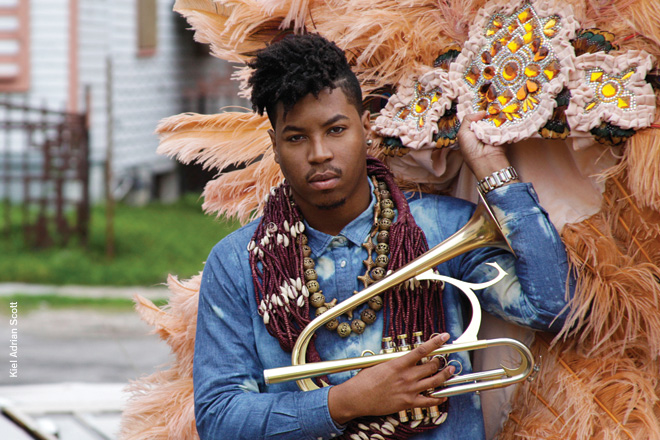
Guest contributor Kiini Ibura Salaam
There are some artists who are born to emote. Coded in their DNA is a command that they express all the colors, ideas, and imaginings that rage within them. You know the ones—those that couldn’t pretend to be square if their lives depended on it. Likely never had a day job and manage to make anything they wear—even a white t-shirt—an expression of their soul.
Christian Scott is one of those artists. It’s almost a couple of months since I saw him perform at the annual Weeksville summer garden party in Bed-Stuy Brooklyn. I can still see him blowing sound through my imagination, with his curly hair, funky sculptural jewelry, and that deep squat that helps him hurl his emotions through his horn.
When Christian Scott plays, you don’t get the sense that he’s playing “a song” or supporting a genre of music; you get the sense that he’s ripped his heart out, placed it on a platter and held it out to the audience, bloody and still throbbing. That is to say, Christian Scott plays from a deeply personal place. When he blows into his horn, it feels like he’s playing for his own sanity; that making sound with his trumpet is as essential as taking a breath; that rendering his life experiences through jazz composition is part of what it means to be alive for him.
And in the tradition of the very best art, his personal act of music-making is gift full of resonance and meaning for the listener. Whether you’re wandering through life glassy-eyed or tender-hearted, his expressive, explosive, tones demand that you feel. The compositions his band played from his new album Yesterday You Said Tomorrow were muscular and highly expansive. They swirled in the open air, creating a soundscape of sonic storytelling that bristled with an aggressive passion that demanded movement of heads, and hands, and feet.
Christian Scott is a man with a vision, blessed with a deep talent, modern sensibilities, and a wild, raging creativity.
The titles of his tunes tell you what he’s about: “K.K.P.D.” (Ku Klux Police Department), “Angola, LA, & the 13th Amendment,” “American’t,” and “Jenacide (The Inevitable Rise and Fall of the Bloodless Revolution). The Village Voice’s Phillip Miynar calls Scott, jazz’s own Public Enemy. It’s true that his music is hopped up on a youthful exuberance that hints at funk and hip hop. But don’t be confused: This is not fusion. The Christian Scott sextet plays jazz, observing the conventions laying down the melody, straying from it to the give the band time to improvise their solos and craft inventive interplays within the composition before returning to emphasize the melodies again.
Yet, it is clear that Christian Scott isn’t reaching to replicate jazz’s history with a reverent restaging of the glorious work of giants. He brings to the tradition his own lion heart, speaking jazz in his authentic voice, with his own accent and abundant swagger. He literally steps into the skin of jazz—fully aware and respectful of its nature and power—and dances it into today. He uses the musical mode of his elders to speak the truth of his youthful soul. It is not that racing rhythmic energies that pulse under the surface of his compositions are some other genre of music. As Miynar clarifies: “his jazz chops are impeccable, it’s coming up as part of the hip-hop generation that adds bite to his playing.”
Christian Scott is a man with a vision, blessed with a deep talent, modern sensibilities, and a wild, raging creativity. He is also a balancing act. His compositions are redolent with the traumatic signposts of the black experience–police harassment, unjust sentencing, political expression—while he himself bursts with a joie de vivre that celebrates artistic expression, musicianship, and life. For Countee Cullen, this curious thing of “mak[ing] a poet black, and bid[ding] him sing” brought to the surface a mournful melancholy; but Christian Scott turns that melancholy inside out, makes it a primal cry that relies on a signature sound to celebrate both his blackness and his song.
Additional link:

